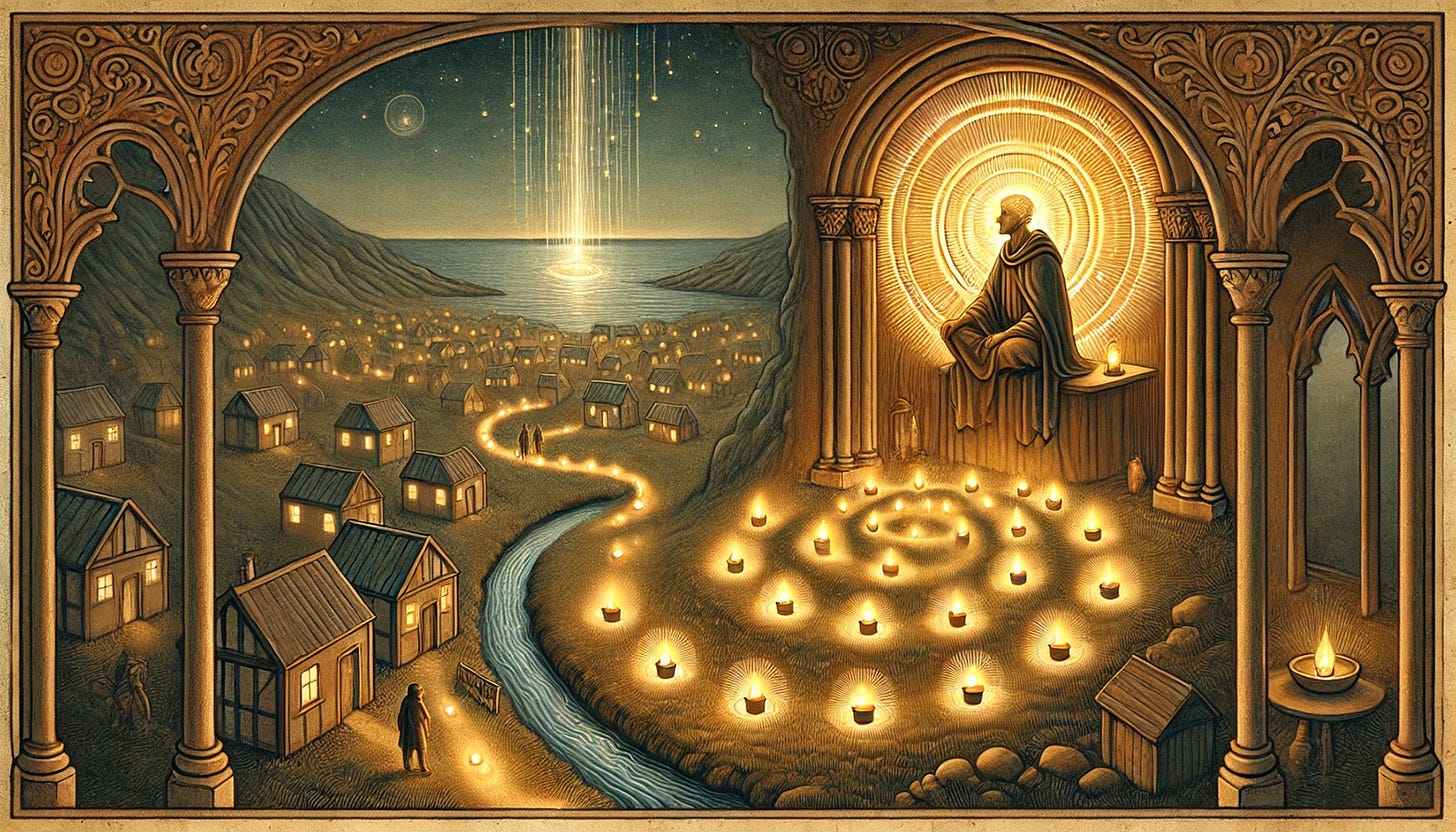The Lantern Keeper
One of our wanderers in residence — Balinor Lyre — is a sage of both alchemy and music. Balinor initially pursued the path of an academic scholar. But, one day, Balinor experienced a cataclysmic psychic event (that’s all he’ll say about it — with a twinkle in his eye and an enigmatic smile). This ‘event’ wrenched him from the path of academic knowledge, and thrust him onto the path of becoming a wise sage. No longer satisfied with just ‘knowing’ in his head, he wants to ‘be’ in his entire being. As he likes to say, “We’re not ‘human knowings’, we’re ’human beings’! Or, better: ‘human becomings’!”
While exploring the cathedral’s vast disheveled library, he found an unmarked, dust-covered tome hidden in a forgotten corner. With the title page missing, he refers to it as simply the GrailHeart Codex. The Codex is filled with cryptic symbols, faded diagrams, and passages in languages long abandoned. Intrigued, Balinor has begun the laborious process of deciphering it.
Balinor has found that each page of the Codex holds insights — not to gain power, control, or easy shortcuts to what one wants (like books of ‘magic’ claim to do), but rather shows how to embrace the inner rhythms and evolution of one’s True Self. It's a book of virtue and wisdom.
Balinor has translated a portion of the Codex for us: a story, and comments on the story.
The Lantern Keeper
In a village nestled in the shadow of the great mountain, there dwelt a man named Calen, the Keeper of the Lanterns. Each evening as the sun slipped beneath the horizon, he would light the lanterns along the winding streets, casting a gentle glow that led his people through the darkness. His work was humble, yet he loved it dearly. But over the years, he had grown troubled by the arguments and discontent he saw among the townsfolk. He believed that if he could help them see things differently, they might live in harmony.
So he went door to door, sharing advice and wisdom, urging them to be more understanding and kind. For many, his words seemed to vanish in the night air, leaving no mark. Others among the villagers, hearing Calen’s words, sought to walk the path he shared. Yet the change they wore was like a garment put on for a day; soon, they cast it aside and returned to their familiar habitual ways. The arguments continued, and Calen began to feel frustrated and defeated.
So Calen’s heart grew heavy, for though he lit the way through the night, he could not illuminate the hearts of the villagers. They quarreled over small things and let bitterness grow between them, and he wished deeply to bring them peace. “If only they could see as I do,” he thought, “then would they know harmony.”
One night, troubled and weary, Calen sought out Ada, a wise woman who had walked the path of wisdom longer than any could recall. “I have tried to help them see peace,” he told her, “but my words fall upon them like rain upon stone. I tell them of gentleness, of understanding, yet they remain as they were, unmoved.”
Ada looked upon him with kindness and said, “Come with me, Calen.” She led him up to the highest hill in the village, where the last of his lanterns flickered like a small star. “Why do you light these lanterns each night?” she asked.
Calen’s answer was simple. “To show the way, so that others may walk without stumbling.”
“And tell me,” she continued, “do you give instruction to each passerby? Do you tell them where their steps should fall?”
He shook his head. “No, the light does not command — it only shines. It is theirs to choose the path they walk.”
Ada placed her hand upon his shoulder. “Yes, Calen. So it is with the light within your heart. If you wish to bring peace to others, be as the lantern. Radiate kindness and quiet strength. Let others be drawn to your light, not by words or commands, but by the warmth that flows from you.”
Calen pondered these words and, from that day on, he ceased trying to instruct the villagers. Instead, he turned inward, nurturing the flame of his own heart. He sought stillness and patience, letting go of judgment and finding a gentler way. And as the days passed, the light within him grew strong and steady, like the lanterns he kept.
In time, the people of the village took notice. They saw in Calen a man who carried peace as one might carry a lantern, quietly, without need of acclaim. Drawn to his presence, they found themselves softened, their hearts illumined by the calm he radiated.
Years passed, and the village grew gentler, not by decree or command, but by the unspoken influence of one who had learned to shine from within. And so it was that Calen came to understand: True change cannot be forced upon others; it must first arise within oneself. To truly change others, one must begin by becoming the light oneself.
In seeking to transform others, turn first to the self, for true, lasting change arises from within. Many have tried to shape others first, to bend others to their will without first tending to the soil of their own hearts. Yet such efforts falter, for they seek to alter a reflection without touching the source. To reach outward while leaving the self unmoved is like trying to cast light without tending the flame.
Know this: when you cultivate harmony within, your actions resonate with a quiet power. Change begins to flow forth, unbidden, like ripples in a still pond, touching all in their path. Let each step toward wisdom, compassion, and integrity radiate gently from within you, and by this quiet strength, you shall inspire others around you to grow and flourish. Such is the nature of transformation — the outer self reflects the inner heart that seeks to know and transform itself.
To force change upon others is to sculpt in sand, where each wave erases what was left behind. Such change, imposed from without, lacks roots and is swiftly undone by the winds of time. But when change arises within, its roots grow deep, anchored in the soil of our own becoming. This kind of transformation cannot easily be shaken or erased, for it has woven itself into the fabric of who we are, in a way that is completely natural and unforced. As we turn inward and refine ourselves, that change shines forth in a way that no external force can diminish. Thus, true transformation stands resilient, radiating from within and inspiring lasting harmony in all that it touches.
— William Zeitler
Thanks for reading GrailHeart! If you haven't already, subscribe for free to receive new posts and to support my efforts. And, GrailHeart will never be hidden behind a paywall, but I would nevertheless be grateful for your paid patronage!
Enjoy this article? Consider forwarding it to a friend!
Like to join in the conversation?








